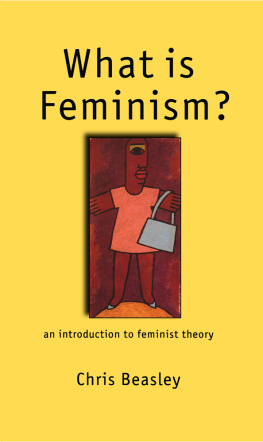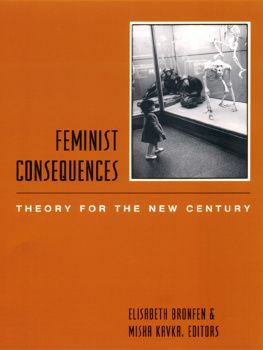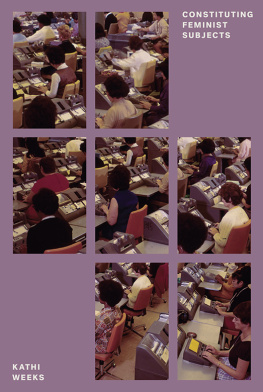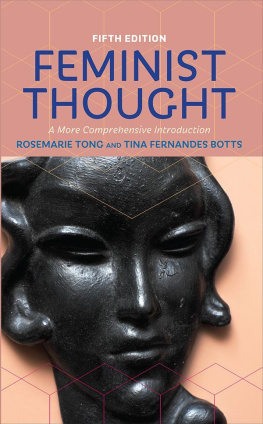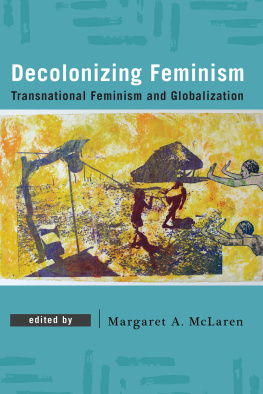ROUTLEDGE LIBRARY EDITIONS:
FEMINIST THEORY
SUBORDINATION
SUBORDINATION
Feminism and Social Theory
CLARE BURTON
Volume 26
First published in 1985
This edition first published in 2013
by Routledge
2 Park Square, Milton Park, Abingdon, Oxon, OX14 4RN
Simultaneously published in the USA and Canada
by Routledge
711 Third Avenue, New York, NY 10017
Routledge is an imprint of the Taylor & Francis Group, an informa business
1985 Clare Burton
All rights reserved. No part of this book may be reprinted or reproduced or utilised in any form or by any electronic, mechanical, or other means, now known or hereafter invented, including photocopying and recording, or in any information storage or retrieval system, without permission in writing from the publishers.
Trademark notice: Product or corporate names may be trademarks or registered trademarks, and are used only for identification and explanation without intent to infringe.
British Library Cataloguing in Publication Data
A catalogue record for this book is available from the British Library
ISBN: 978-0-415-53401-7 (Set)
eISBN: 978-0-203-08796-1 (Set)
ISBN: 978-0-415-63702-2 (Volume 26)
eISBN: 978-0-203-08485-4 (Volume 26)
Publisher's Note
The publisher has gone to great lengths to ensure the quality of this reprint but points out that some imperfections in the original copies may be apparent.
Disclaimer
The publisher has made every effort to trace copyright holders and would welcome correspondence from those they have been unable to trace.
Subordination
Feminism and
Social Theory
Clare Burton
George Allen & Unwin
Sydney London Boston
Clare Burton 1985
This book is copyright under the Berne Convention.
No reproduction without permission. All rights reserved.
First published in 1985
George Allen & Unwin Australia Pty Ltd
8 Napier Street, North Sydney, NSW 2060, Australia
George Allen & Unwin (Publishers) Ltd
Park Lane, Hemel Hempstead, Herts HP1 4TE, England
Allen & Unwin Inc.
Fifty Cross Street, Winchester, Mass 01890, USA
National Library of Australia
Cataloguing in Publication entry:
Burton, Clare.
Subordination.
Bibliography.
Includes index.
ISBN 0 86861 718 0.
ISBN 0 86861 710 5 (pbk.).
1. Feminism. 2. Women and socialism. I. Title.
305.4
Library of Congress Catalog Card Number: 84-73433
Typeset in 9/11 Century Schoolbook by Eurasia Press (Offset), Pte Ltd, Singapore
Printed by Wing King Tong Printing Co. Ltd, Hong Kong
Acknowledgements
The emergence of the women's movement around fifteen years ago escaped my attention for a while, immersed as I was in domesticity and tiny children. Eventually its existence forced me to ask myself questions about my situation. My early ventures into feminist groups developed into a firm commitment and I have remained actively involved in the women's movement and in women's groups within and outside the trade union movement. The initial concern with my own situation and that of women in general gave place in time to an increasingly specific awareness of the situation of working-class women and their families. I felt the need to develop a conceptual framework which would help to clarify for me the contradictions of a feminist movement within a class-structured society.
My first debt is to the women's movement. I owe much to one particular person I met in the early years of feminist activity, Joyce Stevens, who is perhaps unaware of how important she was, as mentor and friend, in my transformation from a wife and mother into a person.
A number of people have helped me in various ways. Doreen Langley, Principal of Women's College, Sydney University, was a most important influence on me, giving me confidence in my academic pursuits during difficult times. As an undergraduate at Sydney University, I was taught Anthropology by Chandra Jayawardena, who later became my professor in Anthropology and Comparative Sociology at Macquarie University. Chandra is no longer alive, but I share with many others a debt to him. He was an important influence on my development as a teacher and a researcher.
My PhD supervisor, Bob Connell, has already received public acknowledgement for the support he has given to feminist researchers. He took on his role as supervisor of my thesis on the condition that I completed it. Without his insistence that I make that commitment to myself, and without his faith and encouragement, I might not have done. Bob and his associates through their writing have also been a significant feature of the Australian feminist landscape, and my book refers to some of their work.
Dean Ashenden's discussions with me and his scribbles in the margins of an earlier draft of this manuscript are perhaps the most important and lasting contribution to the ways in which my theoretical approach is developing. His insistence on seeking out paradoxes, ambiguities and contradictions in the social world and analyses of it is one that I hope I will always share.
Robin Mackenzie, friend and colleague, read drafts, pondered over my strange sentences, and taught me less than he would hope about the English language. He provided emotional and intellectual support through the entire period of writing.
I owe a great deal to my structural substitutes, people who helped me with childcare and domestic labour during critical writing periods. Elizabeth Manson, Sue Taylor and Sally Taylor and their friends, and my former husband, Peter Krinks, all provided me with emotional support, time and care.
The following acknowledgements go back to the years when this manuscript was in draft form for a PhD thesis. It has since been revised again for publication. For their help at various stages in this process I would like to thank Annette Hamilton, Margie Jolly, Gill Bottomley, Brian Fegan, Shirley Dean, Heather Williams, Nick Modjeska, Sue Taylor, Sherry Moriarty, Dave Morrissey, Bob Debus, Tony Branigan, Pieter Degeling, Peter Krinks, John Burton, Cecily Parker, Robert Parker, Ian Bedford, Ann Game, Rosemary Pringle, Kerry James, Pam Benton, Jill Matthews, Sandra Kessler, John Hambley, Caroline Ifeka-Moller, Venetia Nelson and Hester Eisenstein. I am grateful, too, for the comments of anonymous readers of an earlier manuscript. Teresa Brennan, Mia Campioni, Liz Jacka and Liz Gross patiently discussed with me the material I worked on in relation to psychoanalysis.
My children deserve the greatest acknowledgement of all. Rachel, Stephen and Kate are my joy and inspiration.
Technical Note
As I am dealing here with the development of ideas over time, it is particularly important to be precise about the dating of individual contributions to the flow of debate and discussion. Many of the more influential of these sources have been reprinted for wider circulation some time after their first appearance. I have therefore indicated in the text dates of both initial and of subsequent publication, in cases where I am referring to the later source. Initial publication dates appear without brackets. Dates of subsequent publication are bracketed. Both dates are given only on first citation of a work. Thereafter I simply give the date of the publication to which I have myself referred.


